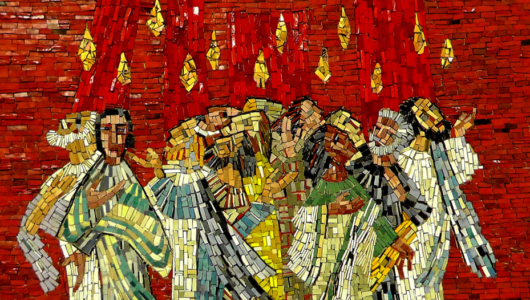We can think of Christmas as the birthday of Christ, but the birthday of the church is Pentecost. Pentecost, observed 50 days after Easter Sunday, commemorates the descent of the Holy Spirit upon the Apostles and other followers of Jesus Christ.
The story of Pentecost is told in the Book of Acts.
Acts 2:1 When the day of Pentecost came, they were all together in one place. 2 Suddenly a sound like the blowing of a violent wind came from heaven and filled the whole house where they were sitting.3 They saw what seemed to be tongues of fire that separated and came to rest on each of them.4 All of them were filled with the Holy Spirit and began to speak in other tongues as the Spirit enabled them.
Roots in Jewish tradition
The word “Pentecost” comes from the Greek word “pentekostē,” which means “fiftieth.” Pentecost has roots in a Jewish harvest festival called Shavuot, which also falls around the same time of year. Shavuot celebrates the giving of the Torah (the first five books of the Hebrew Bible) to Moses on Mount Sinai.
The story of Pentecost
The story of Pentecost unfolds in the second chapter of Acts. Following Jesus’ ascension to heaven, the Apostles and other disciples gathered in Jerusalem for the Feast of Weeks (another name for Shavuot). Suddenly, a powerful wind filled the room, and tongues of fire appeared above the heads of each of them.
The Apostles were filled with the Holy Spirit, which gave them the ability to speak in different languages they had never learned before. This miracle allowed them to communicate with the diverse crowd of pilgrims who had come to Jerusalem from around the world.
Peter, one of Jesus’ disciples, spoke up:
Acts 2:22 “Fellow Israelites, listen to this: Jesus of Nazareth was a man accredited by God to you by miracles, wonders and signs, which God did among you through him, as you yourselves know.23 This man was handed over to you by God’s deliberate plan and foreknowledge; and you, with the help of wicked men, put him to death by nailing him to the cross. 24 But God raised him from the dead, freeing him from the agony of death, because it was impossible for death to keep its hold on him.
The meaning of Pentecost
Pentecost marks the transition of the church from Jesus’s small band of followers to a full-fledged Christian movement. The Holy Spirit’s presence empowered the disciples to overcome their fear and boldly share the Gospel message.
Jesus promised his disciples that he would send a “helper” after his departure (John 14:16-17). The Holy Spirit which descended on them at Pentecost is that helper. Still today, the Holy Spirit empowers believers and guides us in sharing the Gospel message.
The events of Pentecost are remembered in church services at this special time through images of wind and fire. At FUPC, we have used many different sensory experiences to symbolize these elements over the years. Sometimes we wave red and orange ribbons. We have had liturgical dance incorporating visual reminders of fire. Sometimes the choir dresses in red and the pastors’ vestments include fiery colors. Wind instruments are often used in the music for this day, and the service includes hymns about the breath of life or the wind of the spirit.


